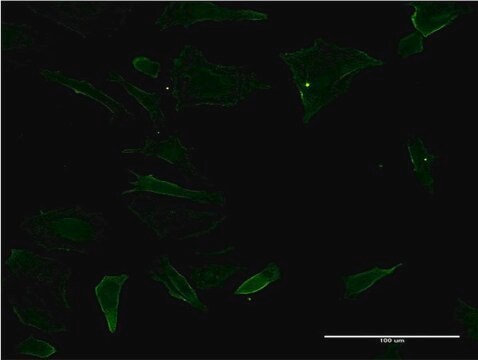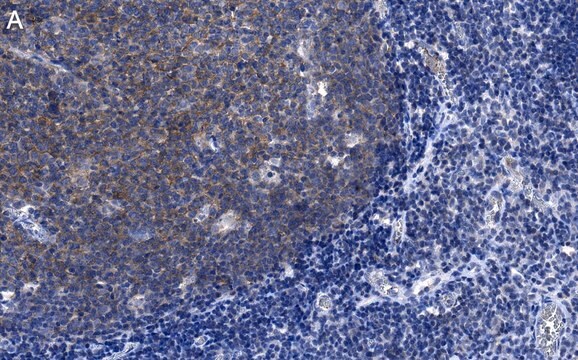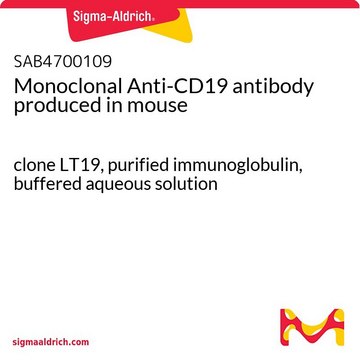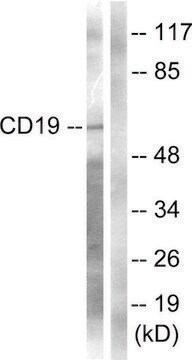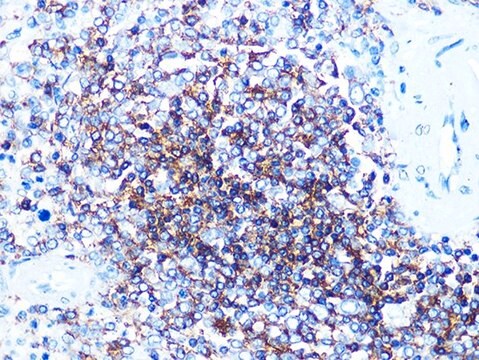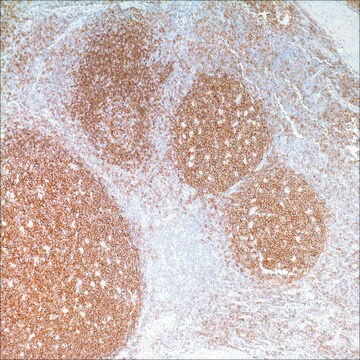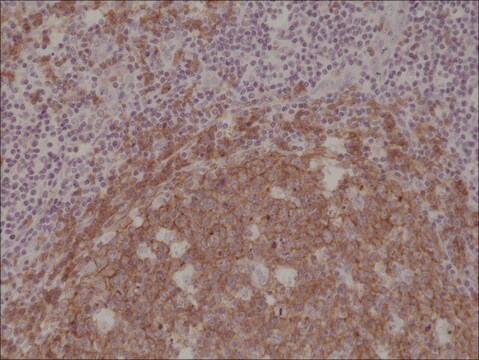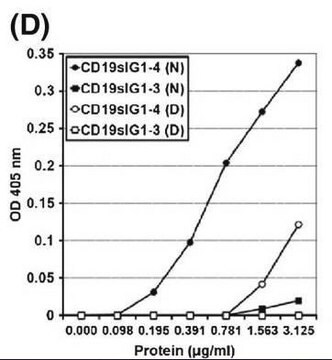SAB5500047
Anti-CD19 antibody, Rabbit monoclonal
clone SP110, recombinant, expressed in proprietary host, affinity isolated antibody
Synonym(s):
Anti-B4, Anti-CVID3
Sign Into View Organizational & Contract Pricing
All Photos(2)
About This Item
UNSPSC Code:
12352203
NACRES:
NA.41
conjugate:
unconjugated
application:
FACS
IHC
IHC
clone:
SP110, monoclonal
species reactivity:
human (tested)
citations:
9
technique(s):
flow cytometry: 1:100
immunohistochemistry: 1:200
immunohistochemistry: 1:200
Recommended Products
biological source
rabbit
Quality Level
recombinant
expressed in proprietary host
conjugate
unconjugated
antibody form
affinity isolated antibody
antibody product type
primary antibodies
clone
SP110, monoclonal
species reactivity
human (tested)
technique(s)
flow cytometry: 1:100
immunohistochemistry: 1:200
isotype
IgG
UniProt accession no.
shipped in
wet ice
storage temp.
2-8°C
target post-translational modification
unmodified
Gene Information
human ... CD19(930)
General description
CD19 (cluster of differentiation 19) is a 95 kDa protein localized on the surface of nearly all B lymphocytes and is considered to be the specific surface marker for B cells. This protein belongs to the immunoglobulin (Ig) superfamily with a cytoplasmic region of ∼240 amino acids and is involved in the regulation of B cell function. The gene encoding CD19 is localized on human chromosome 16p11.2.
CD19 is expressed in B lymphocytes and B-cell lymphoma. It may also be present on some early myeloid progenitors, particularly those of the monoblastic type. It appears to be expressed on myeloid leukemia cells, particularly those of monocytic lineage. Leukemia phenotype studies have demonstrated that the earliest and broadest B cell restricted antigen is the CD19 antigen. CD19 is negative in T lymphocytes, plasma cells, and their tumors.
Immunogen
Synthetic peptide corresponding to C-terminus of human CD19.
Biochem/physiol Actions
CD19 (cluster of differentiation 19) expression is restricted to normal and malignant B-lineage cells. Therefore, it is considered to be a striking target for immunotherapies aimed at B-cell malignancies. CD19 helps B lymphocytes to initiate primary immune response even at low concentrations of antigen. The encoded protein plays a crucial role in initiating intrinsic B cell signaling thresholds by regulating both B cell receptor (BCR)-dependent and independent signaling. It also functions as a biomarker for B-cell development.
Features and Benefits
Evaluate our antibodies with complete peace of mind. If the antibody does not perform in your application, we will issue a full credit or replacement antibody. Learn more.
Physical form
0.1 ml rabbit monoclonal antibody purified by protein A/G in PBS/1% BSA buffer pH 7.6 with less than 0.1% sodium azide.
Disclaimer
Unless otherwise stated in our catalog or other company documentation accompanying the product(s), our products are intended for research use only and are not to be used for any other purpose, which includes but is not limited to, unauthorized commercial uses, in vitro diagnostic uses, ex vivo or in vivo therapeutic uses or any type of consumption or application to humans or animals.
Not finding the right product?
Try our Product Selector Tool.
Storage Class
10 - Combustible liquids
wgk_germany
WGK 2
flash_point_f
Not applicable
flash_point_c
Not applicable
Choose from one of the most recent versions:
Already Own This Product?
Find documentation for the products that you have recently purchased in the Document Library.
B-cell depletion and remissions of malignancy along with cytokine-associated toxicity in a clinical trial of anti-CD19 chimeric-antigen-receptor-transduced T cells.
Kochenderfer JN, et al.
Blood (2011)
The CD19/CR2/TAPA-1 complex of B lymphocytes: linking natural to acquired immunity.
Fearon DT and Carter RH
Annual Review of Immunology, 13(1), 127-149 (1995)
Aleksandra Georgievski et al.
Cell death & disease, 13(4), 337-337 (2022-04-14)
Patient-derived xenografted (PDX) models were generated through the transplantation of primary acute lymphoblastic leukemia (ALL) cells into immunodeficient NSG mice. We observed that ALL cells from mouse bone marrow (BM) produced extracellular vesicles (EVs) with specific expression of inducible heat
Kemeng Wang et al.
Experimental hematology & oncology, 1(1), 36-36 (2012-12-06)
The human CD19 antigen is a 95 kd transmembrane glycoprotein belonging to the immunoglobulin superfamily. CD19 is classified as a type I transmembrane protein, with a single transmembrane domain, a cytoplasmic C-terminus, and extracellular N-terminus. CD19 is a biomarker for
A Pezzutto et al.
Journal of immunology (Baltimore, Md. : 1950), 138(9), 2793-2799 (1987-05-01)
The 95 Kd CD19 antigen is the broadest lineage specific surface marker for B cells: it is present on the surface of virtually all B lymphocytes, including early B progenitor cells. In this study we have evaluated the function of
Our team of scientists has experience in all areas of research including Life Science, Material Science, Chemical Synthesis, Chromatography, Analytical and many others.
Contact Technical Service